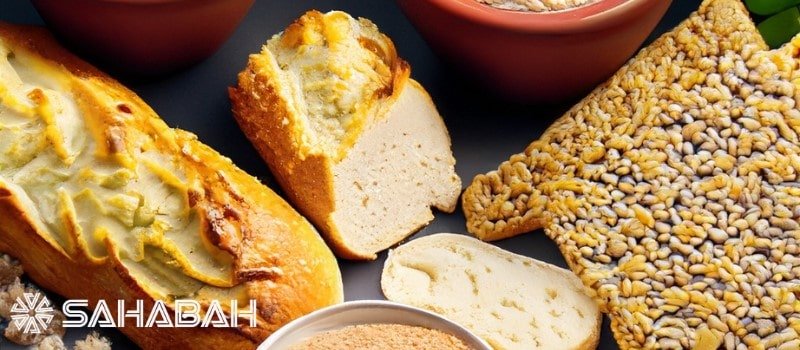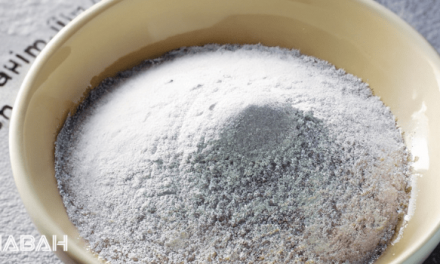Gluten is a protein found in wheat, barley, and rye. It acts as a glue that helps food maintain its shape and texture. Gluten is found in many common foods like bread, pasta, cereals, baked goods, etc. But is gluten considered halal or haram in Islam? This is a debated topic amongst Islamic scholars.
What is Gluten?
Gluten is a general name for the proteins found in:
- Wheat
- Barley
- Rye
It gives elasticity to dough, helping it rise and keep its shape. It gives chewiness and texture to baked goods.
The Halal Status Debate
There are differing views on whether gluten is halal in islam:
| Viewpoint | Rationale |
|---|---|
| Halal | Comes from grains that are halal. Most scholars allow it. |
| Haram | Some say excessive gluten is unhealthy, so should be avoided. Traces of alcohol in processing make it haram for some. |
“Gluten is halal in and of itself. It comes from permissible grains which we are allowed to consume. Only if it is contaminated with alcohol or other prohibited ingredients would that change its ruling.” – Islamic Organization of North America
More research is needed by Islamic experts to examine modern gluten-heavy diets and production methods. But the mainstream view is that foods containing wheat is generally halal and permissible. it will be haram depending if certain other ingredients are used.
Arguments That Gluten is Halal
Most Islamic scholars and experts agree that wheat gluten and vital wheat is halal for the following reasons:
Natural Origin – Gluten comes from natural grains like wheat, barley, and rye which are permitted in Islam.
Traditional Use – Bread, pasta, and other foods that contain gluten have been eaten for centuries in Muslim cultures.
Promotes Food Supply – Gluten enables efficient food production and preservation, allowing more people to be fed.”We do not find a basis in shariah to declare gluten haram or impermissible.” – SeekersGuidance
| Scholar | Rationale |
|---|---|
| Islamic Organization of North America | Gluten sourced from halal grains is halal. |
| SeekersGuidance | No shariah basis to prohibit gluten. |
| Darul Ifta Birmingham | Permissible to consume bread with gluten. |
Therefore, most experts advise that gluten and vital wheat gluten is halal when coming from lawful grains, as it has done for centuries.
Arguments That Gluten Could Be Haram
While the majority of scholars permit gluten, some argue it should be avoided or is questionable:
-
Health Concerns – There are concerns that modern gluten-heavy diets can cause health issues for some people. This could warrant caution or moderation.
-
Processing Methods – Some gluten products may contain traces of alcohol due to certain processing methods like fermentation. This could make specific foods considered haram.
-
Cross-Contamination – Sometimes gluten proteins are substituted with gelatin or other questionable ingredients including pork products, causing cross-contamination issues.
“One should avoid foods that bring more harm than good. If gluten is damaging for someone, it should be avoided.” – AskAMuslim
| Scholar | Rationale |
|---|---|
| AskAMuslim | If gluten is unhealthy, it should be limited. |
| IslamWeb | Permissible to avoid gluten if medically harmful. |
| SeekersGuidance | Breads with too much gluten may be discouraged. |
So while gluten is according to islamic law is halal, these minority opinions suggest situational caution and moderation.
Analysis of the Debate
When analyzing the debate in the muslim community over gluten’s halal status, a few key points emerge:
-
The majority opinion of Islamic experts is that gluten is halal, given its origin from permitted grains. This view has historical precedence.
-
Those who advise caution or avoidance of gluten do so out of precaution, not certainty that it is haram.
-
The processing method or ingredients used in specific products may change the ruling for those items, not gluten as a whole.
-
Issues like cross-contamination demonstrate the need for proper oversight by halal certifying organizations.
| Scholar | Viewpoint |
|---|---|
| Majority | Gluten halal due to grain source |
| Minority | Avoid out of precaution, not prohibition |
“Given its source is lawful, we do not prohibit gluten categorically. But in certain contexts, avoidance may be advisable.” – IslamQA
In summary, the mainstream Islamic position is that gluten is generally permissible, barring contamination issues in certain products. Caution is advised by some, but not obligation.
Frequently Asked Questions: Is Gluten Halal
What is gluten?
Gluten is a protein found in vegetarian food such as cereal grains such as wheat, barley, and rye. It gives dough its elastic texture and helps it rise.
Is gluten halal or haram?
According to Islamic dietary laws, gluten is halal, which means it is permissible according to islamic teaching.
What about wheat gluten? Is it halal?
Yes, wheat gluten is considered permissible according to Islamic law.
Does gluten contain any haram ingredients?
No, gluten itself does not contain any haram sources like pork or beef. It is a protein derived from grains like wheat and rye.
Is there a difference between gluten and gelatin?
Yes, there is a difference between gluten and gelatin. Gluten is a protein composite found in grains, while gelatin is a protein derived from animal sources. Always check.
Can gluten sensitivity affect the halal status of a food product?
No, gluten sensitivity does not affect the halal status of a food product. As long as the ingredients are halal and free from contain pork, the product remains halal.
Is Halal Gluten Free?
No, Halal does not mean gluten free. They are two different things as described in this article.
Is gelatin halal if it contains gluten?
If gelatin contains gluten, it would depend on the source of the gelatin. If the gelatin is derived from pork, then it would not be considered halal.
Are there haram sources that contain gluten?
No, there are no haram sources that contain gluten. Gluten is a protein composite found in grains including bread and does not have any haram ingredients.
What is the halal ruling on products like vital wheat gluten?
Vital wheat gluten is made from wheat flour and is considered halal as long as it is derived from permissible sources like wheat and free from any haram ingredients.
Conclusion
The debate around gluten’s status in Islam comes down to a few key points:
-
Mainstream view – Most experts permit gluten, considering it halal given its origin from grains like wheat, barley, and rye. This agrees with Islamic legal principles.
-
Minority view – A smaller group advises caution around gluten due to health concerns or potential processing methods. But they do not prohibit it entirely.
-
Situational factors – The halal status of specific gluten products depends on manufacturing processes and ingredient sources. Certification is advised.
-
Moderation – Those who avoid gluten do so out of precaution, especially if medically warranted. But moderation is sufficient, not complete prohibition.
“Our principle is that foods themselves are permissible, unless there is certain proof of otherwise.” – SeekersGuidance
In conclusion, the mainstream Islamic stance is that gluten is permissible to consume as a general guideline. But factors like health and manufacturing should be considered on an individual basis.
| Mainstream View | Minority View | |
|---|---|---|
| Status | Permitted | Caution Advised |
| Basis | Origin is lawful grains | Precaution, not prohibition |
This provides a framework for Muslims to make informed decisions about gluten consumption in accordance with Islamic principles.





